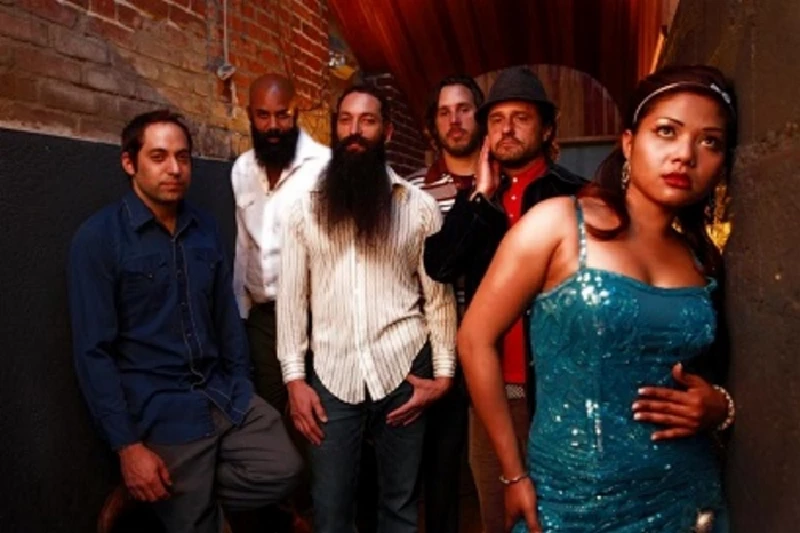Dengue Fever - Interview
by Lisa Torem
published: 3 / 10 / 2013

intro
Lisa Torem chats to Ethan Holtzman from California-based sextet Dengue Fever about their twelve year musical history and whose music fuses Cambodian pop and American psychedelia
Since Dengue Fever’s formation in 2002, the California-based sextet have not only fused Cambodian pop and American psychedelia in a distinctive fashion, but they have established themselves as cutting edge songwriters and arrangers, whose material is sought after by American film makers, television producers and international radio programmes. Their discography, which includes four albums and a compilation, include collaborative melodies that drift sublimely into an elusive space, contemporary pop lyrics and charming, hypnotic dance rhythms. Chhom Nimol’s one-of-a-kind voice immediately attracted brothers Ethan and Zac Holtzman when they attended her performance at The Dragon House in Long Beach, California. Nimol commemorates the fallen heroes of her own youth with her expressive performances, whether singing traditional music in Khmer or American standards or Dengue Fever originals in English. The band looks forward to seeing the world through the eyes of their brand new label Tuk Tuk, and garnering new audiences worldwide as they have already received World Music awards for their catalogue. In an interview with Pennyblackmusic, Dengue Fever’s Ethan Holtzman talks about the band’s beginnings, the heartbreak and happiness behind their lyrical stories and how the music history and landscape of South East Asia has affected his band mates. PB: In the late 1990s, you were traveling by vehicle through Cambodia. The friend you were with had, sadly, contracted dengue fever and you were, of course, concerned, but you were also distracted by the music the driver was playing. Was it purely coincidental that your brother Zac felt a strong attraction to the same musical sounds? EH: Yeah, it was completely random. After a ten-year stint of living in San Francisco, my brother Zac moved back to Los Angeles. He was staying at my place and listening to some of his own music. At first, when I heard what he was playing I was confused. How did he get my Cambodian music to play in the living room where we only had a CD player? Everything I bought while traveling in Cambodia was on cassette tapes. But then we both realized that we shared a love for this obscure Cambodian psychedelic rock music. He had been turned onto it from a friend working at Aquarius Records in San Francisco. I had discovered it while backpacking through Cambodia in the 90’s. PB: In 2002 the band's influences included psychedelia and rock, but your sound continued to evolve. How would you describe the band's evolution? Was it more a matter of using studio effects or exploring non-western tonalities? EH: I think it’s a combination of the two. In the studio and live we use effects, like a Space Echo Tape Delay. It trips things out, slows them down, adds warble, speeds them up, repeats them, etc. So yeah, the pedals we use and the knobs we twist all contribute to our sound and how we evolved along the way. Also, having Chhom Nimol sing in her native tongue, it’s definitely different and adds a lot to the mix. We have been playing together for over twelve years now so we always try to create each album with a unique sound and identity. As individual musicians we have each progressed in our own way. From when we first started to where we are now, I think we approach songwriting and improvising quite differently. For example, when we recorded our first CD, we may have all felt the need to play on everything as much as possible. Now we have more space and really try to just play what the song calls for. PB: Initially it was you on keys and Zac on guitar and then you opened up the sound once saxophonist David Ralicke, drummer Paul Dreux Smith and bassist Senon Williams joined the band. Was that a smooth transition? EH: For sure! It has always been the same five guys and Nimol. From the very beginning when we first practiced together there was a moment where it all made sense to me. I was flooded with an overwhelming emotion as Chhom Nimol held the microphone with us for the first time and sang an old Cambodian classic by Ros Sereysothea/Sinn Sisamouth called 'Today I Learnt to Drink'. She was born in the small city of Battambang, Cambodia. That was where the singers who inspired us came from and unfortunately perished during Pol Pot’s regime. PB: Chhom Nimol has a spectacular range and she uses movement as part of her live performance. The Khmer language sounds very musical as well. Even when singing a classic like 'Both Sides Now' in her native language, the emotion comes through strongly. What was your first impression of Chhom?Secondly, how do you and Chhom work out the arrangements? EH: The first impression was powerful to say the least. My brother and I knew she was the one for our band. The fate was in her hands. And then she realized… we all realized, how important it was for us to shine a light on this body of work that spawned Dengue Fever. As for the arrangements, we work them out in smaller groups. Nimol’s English has improved so much. Every once in a while she will throw us a curve ball live, regarding arrangements. Our motto is to always follow the singer. She keeps us on our toes. We have a good time. PB: On your debut, 'Web of Mimicry', you showcased Cambodian classics. With rough recordings and no sheet music, how did you reproduce the sounds of Cambodian rock from the 1960s and 1970s? EH: They probably had one microphone in the corner of the room next to a screaming fan and air conditioner. Paul Dreux Smith is really good in the studio and he knows how to get a lo-fi sound going if desired. I would give credit to Paul and Trey Spruance (founder of the record label Web of Mimicry-LT) for the sound of our first album. PB: 'Escape from Dragon House', your second album, features a sad ballad, 'One Thousand Tears of a Tarantula'. Can you explain the theme? Who is mostly responsible for writing new material in the band and what is the process? EH: That song is about a singer who was forced to strip naked and sing in circles, under the blaring hot sun, until she dropped dead. It pays tribute to some of the singers and artists who were terribly mistreated and ultimately killed during the horrific genocide played out by Pol Pot and the Khmer Rouge regime. PB: Who is mostly responsible for writing new material and what is the process? EH: Our song writing is mutual. We all contribute what we can to make the song as strong as possible. My brother Zac has a natural talent for writing nice lyrics and vocal melodies, so we utilise that often. A lot of our material we write while in the studio together starts with a bass line or a guitar chord progression and then we build off of it. PB: How did Peter Gabriel get involved in 2008's 'Venus on Earth'? EH: Peter Gabriel invited us to his recording studio, Real World, and we got to spend two weeks straight just writing music in beautiful Box, England. It was an incredible experience surrounded by blue skies, crop circles and glowing orbs. He even said we could borrow any of his keyboards from his personal recording studio. I used his Mini Moog and his Prophet 5 for a few songs when we recorded in the Ley Lines. PB: 'Tiger Phone Card' is about a long-distance relationship, isn’t it? What about the more mysterious 'Seeing Hands'? EH: 'Tiger Phone Card' was written about a friend of ours who had a long distance relationship. He was dating a Cambodian girl who lived in Phnom Penh while he lived in NYC. They are now married, but the song is all about John and Linda Perozzi’s relationship and how difficult it can be to have a romance that is thousands of miles apart. 'Seeing Hands' is a song about mother nature and the environment. If we continue to mistreat the earth, we will go the way of the Dodo and have no place to call our home. PB: 'Sleepwalking through the Mekong' was a documentary filmed in Cambodia, which found you working with top acts there. Some of the band members were there for the first time and some of you were returning. What were your reactions? EH: Our reaction to bringing the band to Cambodia was really powerful. I felt like it legitimised us. We learned so much about Cambodia's culture and how important the music that inspired us was for all generations. All of a sudden, we weren't just a band from LA playing music. We were the first Americans to perform these songs in Cambodia since the genocide. It was raw. PB: The production of Cannibal Courtship was influenced by the band's performances with Seun Kuti and The Egypt 80 at the Womad Fest. In what way did they influence your sound? Also, one track, 'Uku' is incredibly dreamy -- was it difficult to achieve this ethereal sound with six players? EH: When we toured in New Zealand, Seun Kuti and the Egypt 80 were also playing the WOMAD festival. Those guys were inspirational and put on a great live show. We often write new material while touring. Our sound checks turn into writing time. When we see a good live show it bleeds into our life and eventually made its way onto our last record. PB: Dengue Fever formed its own record label, Tuk Tuk. Has that been a curse or a blessing? EH: Well, it’s all brand new, but it seems more like a blessing. It gives us the freedom to do whatever we want to, which is a good thing. PB: Which producers, musicians and bands have most influenced your current sound? EH: Devo, Tom Waits, the Beatles, Blondie, Sinn Sisamouth, Ros Sereysothea, Arthur Lee and Love, the Doors, Mulatu Astaque. We are inspired by so many artists it’s impossible to list them all. But right now I’m listening to 'I Put a Spell on You' by Screaming Jay Hawkins and it sounds pretty good. PB: What's in the future for Dengue Fever? EH: Tuk Tuk Records, Europe, Asia, and USA. Dengue Fever will continue to shine a light as long as our tiny little speck of dirt rotates around this big old sun. PB: Thank you.
Picture Gallery:-


most viewed articles
current edition
John McKay - InterviewRobert Forster - Interview
Spear Of Destiny - Interview
Cathode Ray - Interview
Fiona Hutchings - Interview
When Rivers Meet - Waterfront, Norwich, 29/5/2025
Carl Ewens - David Bowie 1964 to 1982 On Track: Every Album, Every Song
Chris Wade - Interview
Brian Wilson - Ten Songs That Made Me Love...
Shrag - Huw Stephens Session 08.12.10 and Marc Riley Session 21.03.12
previous editions
Heavenly - P.U.N.K. Girl EPBoomtown Rats - Ten Songs That Made Me Love....
Allan Clarke - Interview
Oasis - Oasis, Earl's Court, London, 1995
Manic Street Preachers - (Gig of a Lifetime) Millennium Stadium, Cardiff, December 1999
Barrie Barlow - Interview
Pixies - Ten Songs That Made Me Love...
Beautiful South - Ten Songs That Made Me Love...
Trudie Myerscough-Harris - Interview
Dwina Gibb - Interview
most viewed reviews
current edition
Peter Doolan - I Am a Tree Rooted to the Spot and a Snake Moves Around Me,in a CircleGarbage - Let All That We Imagine Be The Light
Vinny Peculiar - Things Too Long Left Unsaid
Vultures - Liz Kershaw Session 16.06.88
John McKay - Sixes and #Sevens
Little Simz - Lotus
HAIM - I Quit
Morcheeba - Escape The Chaos
Pulp - More
Lapsley - I'm a Hurricane, I'm a Woman In Love
Pennyblackmusic Regular Contributors
Adrian Janes
Amanda J. Window
Andrew Twambley
Anthony Dhanendran
Benjamin Howarth
Cila Warncke
Daniel Cressey
Darren Aston
Dastardly
Dave Goodwin
Denzil Watson
Dominic B. Simpson
Eoghan Lyng
Fiona Hutchings
Harry Sherriff
Helen Tipping
Jamie Rowland
John Clarkson
Julie Cruickshank
Kimberly Bright
Lisa Torem
Maarten Schiethart